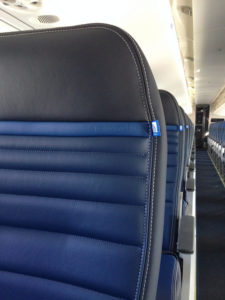 When the person in front of you on a plane reclines their seat to the max, there are a few ways you can respond.
When the person in front of you on a plane reclines their seat to the max, there are a few ways you can respond.
You can accept it.
You can get angry about it.
You can politely ask the person to move their seat forward a bit.
I think a lot of us are a little afraid of that last option – fearful of an angry reaction, perhaps, or being seen as a complainer, or just “not wanting to get into it” (whatever “it” might mean).
Yet that’s just what I did on a recent flight between San Francisco and New York. The guy had pushed his seat back so far, so fast towards my 5’ 9” frame that my laptop wedged between my ribs and the seatback in front of me. Ouch! Instead of letting irritation take over, though, I tapped him on the shoulder and asked if he’d move forward – which he did, and nicely so.
It reminded me of how people are truly much kinder than we often assume. Trapped in our own brains, tangled in our own thoughts, fears, and personal histories, it’s all too easy to let those things color how we experience and respond to current events.
On the whole, people are more giving and helpful than we may give them credit for. And in truth, it is often others who make it possible for our lives to even function.
That’s a truth that can be hard to see, at least for us Americans. Our quintessential archetype is The Rugged Individualist. Whatever we accomplish – so goes the national philosophy – is by our own doing. If we fail, it’s our own fault.
While each of those points can be somewhat true, they simultaneously deny the reality that we are deeply reliant on others every day for even our most basic needs.
Consider all the people who had a hand in making your last meal possible – the workers who grew and harvested the crops; the buyers and wholesalers who got those crops to stores and processors; the grocery workers who stocked and sold the products.
Or think about all who make it possible for you to commute to and from work each day – vehicle makers and sellers; mass transit drivers; fuel producers; the workers who built and maintain the road and railways; the government regulators who help oversee our safety; other drivers who we trust to follow the rules of the road.
Then there are all the small, individual acts that help us through our daily lives. Maybe it’s the person who holds a door open for you when your arms are full. Or someone who lets you go ahead of them in line, seeing that you seem in a hurry. Or the person who sees you leaving your phone or keys behind and rushes to bring them to you.
And let’s not forget those we hire to help us accomplish something, from the cabbie who gets us from here to there, to the electrician who repairs a faulty outlet in our home, to the server who makes sure we have an enjoyable restaurant meal.
These acts of service are just as worthy of our gratitude as unexpected favors and small acts of kindness – not just a robotically polite thank you but a heartfelt expression in response to the help that moves us more easily through our lives.

This holiday, I encourage you to think beyond the broad blessings you identify in your life – your health, your family, the most basic needs of food and shelter – to the smaller acts that enrich our lives every single day. Consider saying “thank you” more and meaning it – focusing on the “giving” in Thanksgiving.
When you do this, watch the response of the individual you’re thanking. You may be surprised at how genuinely pleased and, indeed, grateful they are to know that their efforts have been appreciated, that what they do is meaningful. You can’t help but think this putting forward of positivity creates a chain of gratitude, another manifestation of paying it forward.
Images by airbus777 and
Bart Maguire, via Flickr